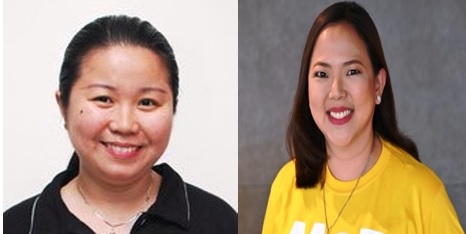The word “pivot” is used often these days. Its original meaning was “anything or any person on which something or someone functions or depends vitally.” In the context of COVID-19, “pivot” has come to mean how a company or an enterprise has turned things around so it can continue to survive, and even thrive, amidst ever-changing lockdowns and quarantines.
At the recent “Stories from Viber Communities: Growing Your Brand During a Crisis” virtual roundtable, Viber gathered Beverly Ho of the Department of Health (DOH), Joaquin San Agustin of SM Supermalls, Christina Lao of MacDonald’s Philippines and Brigette Villarin of the Inquirer Group of Companies to share how they became part of the Communities on Viber. By going into such a community, they showed how the app helped their brands bounce back, sometimes in leaps and bounds.

DOH’s Beverly Ho and Joaquin San Agustin of SM Supermalls,
Ho, director of the DOH Health Promotion Bureau, said her department “didn’t have a platform like this before the pandemic.” It was a time when, she added, “people were panicking” as they cast about for information. Her bureau heard about a Viber Community from another country which had a similar chat group. Before long, her office put up one until membership bloomed to two million. The number is still growing.
In that community, members can see the DOH’s infographics about COVID-19. Ho said they are careful “not to flood subscribers with too much information.We don’t put in just any message,” We are aware of fake news.”
She said apart from information on COVID-19, the DOH is already including information on other ailments and on living a healthy lifestyle. She observed that one thing the pandemic had caused was “people are more conscious of health in schools, homes and workplaces.”
San Agustin, senior marketing vice president at SM, said in mid-March this year, the only part of their malls allowed to operate were the essentials—supermarkets and pharmacies. But, he said, “each mall is a part of a community” so within a month after the lockdown, they reached out to their stakeholders—the consumers and the tenants—and launched a Viber service.
By doing so, the malls helped consumers consummate sales with tenants in what he called “the same delightful behavior, shopping, in the comfort of their homes.”
He said the malls have now focused on “hyper-localizing content to address the particular eccentricities of particular communities.” They have reached out not just to technology-savvy youth but also to senior citizens who have taught themselves how to work the Viber app and who order food for curbside takeout or for delivery.
The malls, he added, have the riders and personal shoppers at the ready. He said these services are the “equivalent of basically listening to the customer. We have to listen to the consumers not just about what they need now but in the future, too.”

PDI’s Brigette Villarin and Christina Lao of MacDonald’s Philippines
Lao, McDonald’s digital acceleration director, said her company adopted the strict policy of “safety first,” especially during the quarantine. Among the changes introduced was contactless service. The service crew and cooking area were safeguarded. In the meanwhile, she said, “People craved information because of our limited operating hours. They wanted to know how they could maximize the window open to them.” Through Viber, the food chain was able to identify open stores with links.
To Lao, the app functioned like “hearing it from us firsthand. This communication platform provided relevant information inspired by the DOH model.” She added that like the franchise holder George Yang, a lot of senior citizens are into gadgets so the company makes an effort to make the “content enticing so consumers stay on the site.”
Other innovations in her stores are no closure but instead turning the party rooms into areas where teachers can hang out and use. These rooms, usually venues for children’s birthday parties, weren’t being used anymore because of the pandemic. The drive-through has been changed also to accommodate not just private cars but also bikes, tricycles and kalesa.
Asked how media consumption changed during the pandemic, Villarin, director for operations at Megamobile, Inc., member of the Inquirer Group of Companies, said her newspaper, the Philippine Daily Inquirer, curates the news people needed to be aware of. At the height of the lockdown, she added, “people were scared and wanted to know the changes in health regulations.”
What her company did was to create an information desk where people could send questions and chat with Inquirer researchers who could look for answers or links to past articles. She said this was especially effective for senior citizens.
She continued, “COVID pushed us to rely on technology, to do everything online from grocery delivery to shopping within communities.” She observed the rise of community commerce that connects directly with consumers.